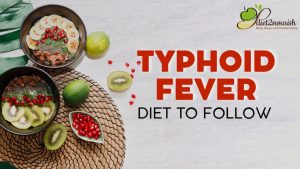Typhoid is a bacterial infection caused by Salmonella typhi that is transmitted through contaminated food or water. Symptoms include high fever, stomach pain, headache, and loss of appetite. Treatment for typhoid includes antibiotics and a specific diet that can help relieve symptoms and promote recovery.
The typhoid diet is designed to be gentle on the digestive system while providing the necessary nutrients to support the immune system. Here are some general guidelines for a typhoid diet
- Clear liquids: During the first few days of illness, it is recommended to consume clear liquids such as water, broth, and tea to stay hydrated and prevent dehydration. Avoid fruit juices and carbonated beverages as they can irritate the stomach.
- Bland foods: Once the initial fever has subsided, slowly introduce bland foods such as boiled rice, boiled potatoes, boiled vegetables, and plain crackers. Avoid spicy, oily, or fried foods as they can aggravate the stomach.
- High-calorie foods: Since typhoid can cause a loss of appetite, it is essential to consume high-calorie foods such as soups, milkshakes, and smoothies to maintain energy levels. These foods should be easy to digest and should not contain any solid particles.
- Soft foods: Foods that are soft and easy to chew such as porridge, mashed potatoes, and scrambled eggs are ideal for a typhoid diet. Avoid foods that are hard to digest or require a lot of chewing such as raw vegetables and tough meats.
- Avoid raw or undercooked foods: It is crucial to avoid raw or undercooked foods such as eggs, meat, and seafood as they can contain harmful bacteria that can worsen the infection.
- Hygiene: Proper hygiene practices such as washing hands frequently, using clean utensils, and cooking food thoroughly can help prevent the spread of typhoid.
- Nutritional supplements: In some cases, nutritional supplements such as multivitamins and iron supplements may be recommended to support the immune system and promote recovery.
In summary, a typhoid diet should consist of clear liquids, bland foods, high-calorie foods, soft foods, and cooked foods. It is important to avoid raw or undercooked foods and practice good hygiene to prevent the spread of typhoid. Nutritional supplements may be recommended in some cases to support recovery. If you suspect that you or someone you know has typhoid, seek medical attention immediately.
